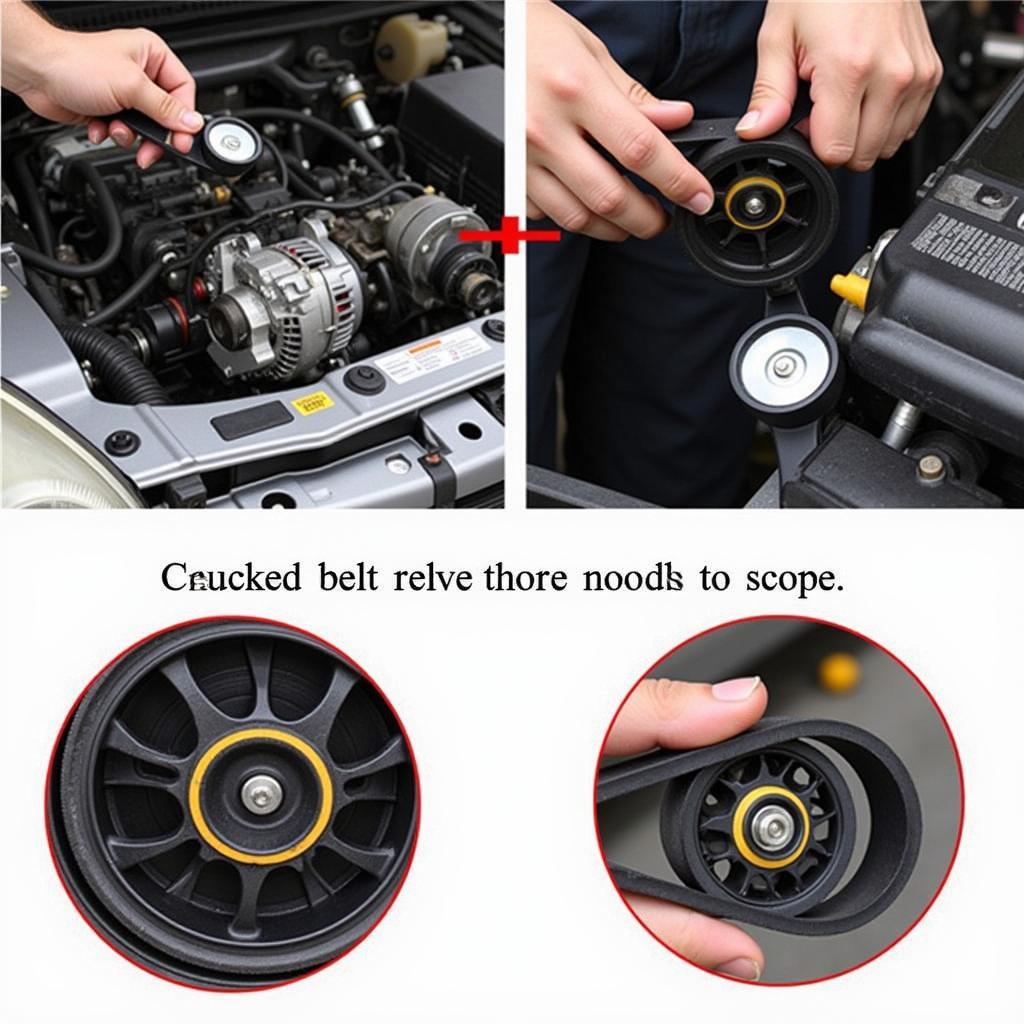That annoying squeal coming from under your hood? It’s likely a squeaky car belt, a common car problem that can range from a minor annoyance to a sign of more serious issues. This guide will walk you through everything you need to know about how to diagnose and fix a squeaky car belt, saving you time and money. easy car problem fixes
Why is My Car Belt Squeaking?
Car belts play a crucial role, powering essential components like the alternator, power steering pump, and air conditioning compressor. Over time, these belts can wear down, crack, or become misaligned, leading to that tell-tale squeak. Other culprits include worn pulleys, fluid leaks, and even extreme temperatures.
Common Causes of Squeaky Car Belts
- Wear and Tear: Just like tires, belts have a limited lifespan. Over time, the rubber degrades, leading to cracks and dryness, which causes squeaking.
- Misalignment: A belt that’s not properly aligned on its pulleys can rub against other components, creating friction and noise.
- Worn Pulleys: Damaged or worn pulleys can create uneven belt tension, contributing to squeaking.
- Fluid Leaks: Oil or coolant leaks can contaminate the belt, causing it to slip and squeak.
- Temperature Extremes: Extreme cold or heat can affect the belt’s flexibility and grip, making it more prone to squeaking.
Diagnosing the Squeak
Pinpointing the source of the squeak is the first step to a successful Squeaky Car Belt Fix. Start by listening carefully to when the squeak occurs. Does it happen when you start the engine, when you turn the steering wheel, or when you accelerate? This can offer valuable clues.
Using a Stethoscope to Pinpoint the Noise
A mechanic’s stethoscope can help you isolate the source of the squeak. By placing the stethoscope on different components around the belt system, you can identify which pulley or belt section is causing the noise.
 Diagnosing a Squeaky Car Belt
Diagnosing a Squeaky Car Belt
How to Fix a Squeaky Car Belt
Now that you’ve diagnosed the problem, let’s explore the solutions. [how to fix a squeaking sound on the car](https://autotippro.com/how to fix-a-squeaking-sound-on-the-car/) Depending on the cause, the fix can be as simple as tightening the belt or as involved as replacing worn components.
Simple Fixes: Tightening and Lubricating the Belt
- Check Belt Tension: A loose belt is a common cause of squeaking. Consult your car’s manual for the proper belt tension specification.
- Tighten the Belt: Use a wrench to adjust the tensioner pulley and tighten the belt. Be careful not to overtighten.
- Apply Belt Dressing: A belt dressing spray can temporarily quiet a squeaking belt by adding grip and lubrication. However, this is not a long-term solution.
More Involved Fixes: Replacing Components
- Replace the Belt: If the belt is cracked, frayed, or excessively worn, it’s time for a replacement.
- Replace Worn Pulleys: Damaged pulleys can cause uneven belt tension and squeaking. Inspect the pulleys for signs of wear and replace them if necessary.
- Address Fluid Leaks: If a fluid leak is the culprit, address the leak before replacing the belt. Otherwise, the new belt will quickly become contaminated.
“A squeaky belt is often a symptom, not the problem itself. Don’t just mask the noise, find the root cause,” says John Davis, Senior Automotive Technician at Davis Auto Repair.
Preventing Future Squeaks
Regular maintenance is key to preventing future squeaky car belt issues. fixing squek in car
- Regular Inspections: Inspect your belts during routine oil changes or maintenance checks. Look for cracks, fraying, and signs of wear.
- Preventative Replacement: Consider replacing your belts every 60,000 to 100,000 miles, even if they don’t appear worn. This can prevent unexpected breakdowns.
- Address Leaks Promptly: Fix any fluid leaks immediately to prevent belt contamination and damage.
“Preventative maintenance is always cheaper than a major repair down the road. A simple belt inspection can save you headaches and money,” adds Maria Sanchez, Lead Mechanic at Sanchez Auto Services.
Conclusion
Fixing a squeaky car belt can be a straightforward DIY project or may require the assistance of a qualified mechanic. By understanding the causes and solutions outlined in this guide, you can effectively address the issue and prevent future squeaks. If you’re unsure about tackling the repair yourself, don’t hesitate to contact us at AutoTipPro for expert assistance. Call us at +1 (641) 206-8880 or visit our office at 500 N St Mary’s St, San Antonio, TX 78205, United States. We’re here to help!




Leave a Reply